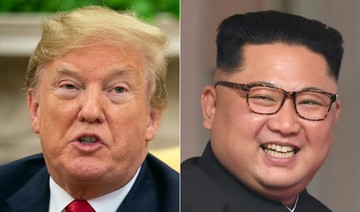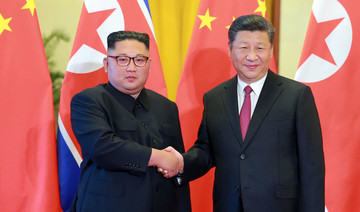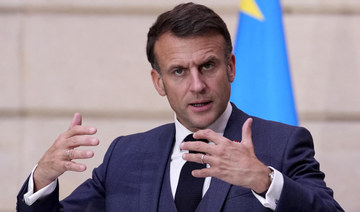SEOUL, South Korea: Lee Soo-nam was 8 the last time he saw his older brother. Sixty-eight years ago this month the boy watched, bewildered, as his 18-year-old brother left their home in Seoul to escape invading North Korean soldiers who were conscripting young men just weeks after invading South Korea to start the Korean War.
An hour later his brother, Ri Jong Song, was snatched up by North Korean soldiers near a bridge across Seoul’s Han River. Lee always assumed Ri died during the three-year war that killed and injured millions before a cease-fire in 1953, but his mother prayed daily for her lost son’s return, only giving up a few years before her death in 1975.
But Ri survived the war, living in North Korea. The brothers, now 76 and 86, will be among hundreds of Koreans who will participate, starting Monday, in a week of temporary reunions of divided families. Many have had no contact with each other since the war cemented the division of the peninsula into the North and South.
The elderly relatives gathering at North Korea’s scenic Diamond Mountain resort know that, given the fickle nature of ties between the rival Koreas, this could be the last time they see each other before they die.
“I’m nervous. I’m still unsure whether this is a dream or reality. I just want to thank him for staying alive all these years,” Lee said in an interview in his home in Seoul, not far from where he last saw his brother.
Since the end of the war, both Koreas have banned ordinary citizens from visiting relatives on the other side of the border or contacting them without permission. Nearly 20,000 people have participated in 20 rounds of face-to-face reunions since 2000. No one has had a second chance to see their relatives.
This week’s reunions come after a three-year hiatus during which North Korea tested three nuclear weapons and multiple missiles that demonstrated the potential of striking the continental United States.
At past meetings, elderly relatives — some relying on wheelchairs or walking sticks — have wept, hugged and caressed each other in a rush of emotions. According to Seoul’s Unification Ministry, which handles inter-Korean affairs, more than 500 separated South Koreans and their family members will cross the border for two separate rounds of reunions between Aug. 20 and 26.
At Diamond Mountain, Lee expects to meet Ri and his 79-year-old North Korean wife and 50-year-old son. Lee will bring more than a dozen family photos, including a black-and-white picture of Ri in a buzz-cut when he was 16 or 17.
“That’s how I remember him,” Lee said. “I lost a brother and my parents lost a child, but my brother lost his parents, siblings, friends and an entire hometown, and he probably spent his whole life longing for all of those things. It’s heartbreaking to think about.”
The difference in the siblings’ family names is a product of the Korean Peninsula’s division — each country uses different English transliteration rules, so Lee in the South is spelled Ri in the North.
Many of the South Korean participants in the reunions will be war refugees who were born in North Korea.
Kim Kwang-ho, 79, was among some 14,000 refugees who were ferried to South Korea by the American freighter SS Meredith Victory in December 1950 in one of the world’s largest humanitarian operations. Also on the ship were the parents of South Korean President Moon Jae-in, who described the evacuation as a “voyage of freedom and human rights” in a speech in Washington last year.
At the reunions, Kim expects to meet his 78-year-old brother, Kim Kwang Il, and his sister-in-law. Kim has vivid memories of what he described as a beautiful hometown in northern North Korea, where he plowed rice and corn fields with cattle, picked peaches and apricots from trees and spent hours swimming in brooks.
He gets emotional when talking about the mother he left behind, who used to cry over the death of his brother during the war.
“I have clear memories of events that happened,” Kim said. “But somehow I can’t remember the faces of my mother and brother.”
Behind the raw emotions, the meetings are tightly coordinated events where participants are closely watched by North Korean officials and dozens of South Korean journalists.
As in previous reunions, South Korea’s Red Cross, which organizes the events with its North Korean counterpart, has issued a guidebook telling South Koreans what to do and what not to do.
“Political comments such as criticism of the North’s leadership and the state of its economy could put your (North Korean) family members into a difficult situation,” the green book says. “If a North Korean family member sings a propaganda song or makes a political comment, restrain them appropriately by naturally changing the subject of the conversation.”
Lee knows he won’t be able to talk much about what happened when his brother was taken in August 1950. Instead, he plans to share childhood memories, such as when Ri took his younger brothers on a hike on nearby Mount Nam to look at foxes living near an old fortress wall.
South Koreans also can’t give their North Korean relatives luxury items because of international sanctions imposed on the North over its nuclear and missile programs, with past cash gifts banned this year to reflect the sanctions, according to a South Korean Red Cross official who didn’t want to be identified, citing office rules.
The reunions are occurring during a flurry of diplomatic contacts. In recent months, North Korean leader Kim Jong Un has met Moon twice and held a summit with President Donald Trump in Singapore, where they issued a vague goal of a nuclear-free peninsula, without describing how and when it would occur.
Moon, who plans to meet Kim again in September in Pyongyang, North Korea’s capital, says progress in inter-Korean reconciliation will be a crucial part of international efforts to resolve the nuclear standoff with the North. The Koreas have held military talks and are fielding combined teams at this month’s Asian Games in Indonesia in a gesture of goodwill.
Still, South Korea has failed to persuade the North to accept its long-standing proposal for more frequent reunions with more participants. North Korea has also ignored the South’s suggestion of hometown visits and letter exchanges.
The limited number of reunions cannot meet the demands of divided family members, who are now mostly in their 80s and 90s, South Korean officials say. More than 75,000 of the 132,000 South Koreans who have applied to participate in reunions have died, according to government figures.
Analysts say North Korea sees the reunions as an important bargaining chip with the South, and doesn’t want them expanded because they give its people better awareness of the outside world. While South Korea uses a computerized lottery to pick participants for the reunions, North Korea is believed to choose based on loyalty to its authoritarian leadership.
“When we meet this time, that will be the end for me,” said Yoon Heung-kyu, a 91-year-old Korean War veteran from the South and a staunch anti-communist campaigner in his youth who will be meeting his North Korean brother-in-law and grandnephew.
“North Korea guards against exposing its people to the free South because of fear of a regime collapse. It just allows 100 or so participants every several years to save face internationally,” he said. “These aren’t really family reunions; if they were, we would be meeting in our hometowns, not at Diamond Mountain.”
‘Dream or reality?’ Koreans to meet after decades apart
‘Dream or reality?’ Koreans to meet after decades apart
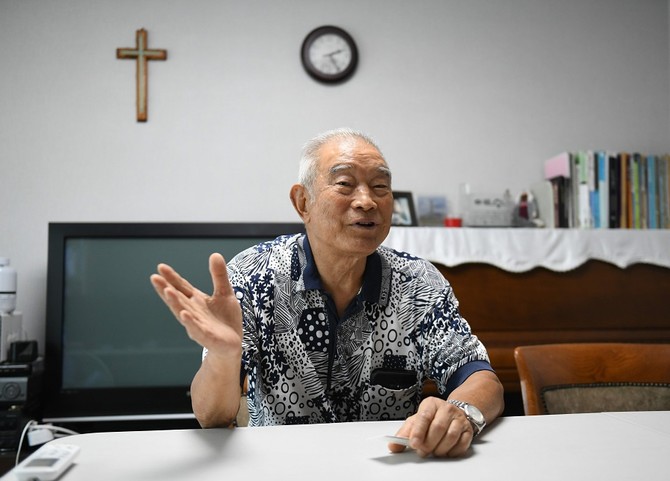
- It is a move in the right direction, but this could still be the last time the relatives meet
- Since the end of the war, both Koreas have banned ordinary citizens from visiting relatives on the other side of the border
AstraZeneca to withdraw COVID vaccine globally as demand dips

- AstraZeneca says initiated worldwide withdrawal due to “surplus of available updated vaccines”
- Drugmaker has previously admitted vaccine causes side effects such as blood clots, low blood platelet counts
AstraZeneca said on Tuesday it had initiated the worldwide withdrawal of its COVID-19 vaccine due to a “surplus of available updated vaccines” since the pandemic.
The company also said it would proceed to withdraw the vaccine Vaxzevria’s marketing authorizations within Europe.
“As multiple, variant COVID-19 vaccines have since been developed there is a surplus of available updated vaccines,” the company said, adding that this had led to a decline in demand for Vaxzevria, which is no longer being manufactured or supplied.
According to media reports, the Anglo-Swedish drugmaker has previously admitted in court documents that the vaccine causes side-effects such as blood clots and low blood platelet counts.
The firm’s application to withdraw the vaccine was made on March 5 and came into effect on May 7, according to the Telegraph, which first reported the development.
The Serum Institute of India (SII), which produced AstraZeneca’s COVID-19 vaccine under the brand name Covishield, stopped manufacturing and supply of the doses since December 2021, an SII spokesperson said.
London-listed AstraZeneca began moving into respiratory syncytial virus vaccines and obesity drugs through several deals last year after a slowdown in growth as COVID-19 medicine sales declined.
Ex-national security adviser criticizes UK PM for not suspending arms sales to Israel

- Lord Peter Ricketts: ‘Pity’ govt ‘could not have taken a stand on this and got out ahead of the US’
- American decision to pause delivery of weapons seen as warning to Israel to abandon or temper plan to invade Rafah
LONDON: A former UK national security adviser has condemned Prime Minister Rishi Sunak for failing to suspend weapons sales to Israel, The Independent reported on Wednesday.
After the US paused a delivery of bombs, Sunak has yet to follow suit despite mounting pressure from within his own Conservative Party.
Lord Peter Ricketts, a life peer in the House of Lords and retired senior diplomat, said Britain should have been “ahead of the US” in ending arms sales to Israel.
The US decision to pause the shipment of bombs is seen as a warning to Israel to abandon or temper its plan to invade Rafah in southern Gaza.
More than 1 million Palestinian civilians are sheltering in the city after being forced out of northern sections of the enclave.
Ricketts said it is a “pity” that “the government could not have taken a stand on this and got out ahead of the US.”
Conservative MP David Jones made the same call in comments to The Independent, saying: “We should give similar consideration to a pause.”
He added: “Anyone viewing the distressing scenes in Gaza will want to see an end to the fighting. Hamas is in reality beaten. Now is the time for diplomacy to bring this dreadful conflict to an end.”
At Prime Minister’s Questions in the House of Commons, Sunak faced a flurry of questions over Britain’s potential ties to an Israeli invasion of Rafah. He said the government’s position remains “unchanged.”
Taliban deny Pakistani claims of Afghan involvement in attack on Chinese workers

- According to Islamabad, suicide attack that killed 5 Chinese in Pakistan was planned in Afghanistan
- Afghan Defense Ministry says the March attack showed weakness of Pakistan’s security agencies
KABUL: The Taliban on Wednesday rejected allegations of Afghan involvement in a recent deadly attack on Chinese workers in neighboring Pakistan.
The five Chinese nationals, who were employed on the site of a hydropower project in Dasu in northwestern Khyber Pakhtunkhwa province bordering Afghanistan, were killed alongside their driver in a suicide blast on March 26.
Pakistan’s military said on Tuesday that the attack was planned in Afghanistan and that the suicide bomber was an Afghan citizen.
Maj. Gen. Ahmad Sharif, a spokesperson for Pakistan’s army, also told reporters that Islamabad had “solid evidence” of militants using Afghan soil to launch attacks in Pakistan, that since the beginning of the year such assaults had killed more than 60 security personnel and that authorities in Kabul were unhelpful in addressing the violence.
The Taliban’s Ministry of Defense responded on Wednesday that the claims were “irresponsible and far from the reality.
“Blaming Afghanistan for such incidents is a failed attempt to divert attention from the truth, and we strongly reject it,” Enayatullah Khwarazmi, the ministry’s spokesperson, said in a statement.
“The killing of Chinese citizens in an area of Khyber Pakhtunkhwa, which is under tight security cover of the Pakistani army, shows the weakness of the Pakistani security agencies or cooperation with the attackers.”
The Dasu attack followed two other major assaults in regions where China has invested more than $65 billion in infrastructure projects as part of its wider Belt and Road Initiative.
On March 25, a naval air base was attacked in Turbat in Pakistan’s Balochistan province, and on March 20, militants stormed a government compound in nearby Gwadar district, which is home to a Chinese-operated port.
Pakistan is home to twin insurgencies, one by militants related to the Tehreek-e-Taliban Pakistan — the Pakistani Taliban — and the other by ethnic separatists who seek secession in southwestern Balochistan province, which remains Pakistan’s poorest despite being rich in natural resources.
While the attacks in Balochistan were claimed by the Baloch Liberation Army — the most prominent of several separatist groups in the province, no group claimed responsibility for the one in Dasu.
Blaming it on Afghanistan, however, was “baseless,” according to Naseer Ahmad Nawidy, an international relations professor at Salam University in Kabul.
“The insurgency in the region has existed for very long now and cannot be attributed to a specific area or country. Pakistan looks at the Islamic Emirate in its current form as a threat to its interests. The Pakistan government needs to develop its relations with the Islamic Emirate based on equal rights and goodwill for stability in the whole region,” Nawidy told Arab News.
“Stability in the region requires mutual cooperation and trust. The governments in Afghanistan and Pakistan must end the relations crisis at the earliest. Repeating such claims will further increase the tensions and may cause enmity between the two countries.”
Abdul Saboor Mubariz, a political scientist and lecturer at Alfalah University in Jalalabad, said that Pakistan’s claims were meant to put pressure on the Taliban to help Islamabad in its campaign against the TTP.
“Pakistan’s government is using different forms of pressure such as forcible deportation of Afghan refugees, claims about security threats from Afghanistan, closing border points and creating challenges for Afghan traders,” he said, adding that accusations and claims of links to attacks were affecting the Taliban administration as it still sought recognition from foreign governments.
“The claims are critical for the Islamic Emirate as it is seeking engagement with the countries in the region and across the globe, while the government remains unrecognized by all world countries.”
India PM Modi’s party deletes X post accused of targeting Muslims

- Video featured opposition politicians scheming to abolish programs for marginalized Hindus, distribute them to Muslims
- India’s PM Modi, expected to win polls, has made controversial remarks in election speeches, referring to Muslims as “infiltrators”
New Delhi: Indian Prime Minister Narendra Modi’s party on Wednesday deleted a cartoon video posted on social media platform X that was criticized for targeting minority Muslims during an ongoing national election.
India’s election code bans campaigning based on “communal” incitement but the Hindu-nationalist Bharatiya Janata Party (BJP) has frequently invoked the country’s main religious divide on the campaign trail.
The video, posted by an official BJP account, featured caricatures of opposition politicians scheming to abolish special affirmative action programs for marginalized Hindu groups and instead distribute them to Muslims.
The election commission wrote to the platform’s Indian office on Tuesday saying the “objectionable” post violated Indian law.
On Wednesday the original post had disappeared from the platform, with a notice saying it had been deleted.
A police complaint filed by the opposition Congress party accused the video of promoting “enmity between different religions.”
Modi, who is widely expected to win a third term in office when the six-week general election concludes next month, has made similar claims to the video in campaign appearances since last month.
He has used public speeches to refer to Muslims as “infiltrators” and “those who have more children,” prompting condemnation from opposition politicians, who have complained to election authorities.
On Tuesday he again said that his political opponents would “snatch” affirmative action policies meant for disadvantaged Hindus and redirect them to Muslims.
Modi remains widely popular a decade after coming to power, in large part due to his government’s positioning of the nation’s majority faith at the center of its politics, despite India’s officially secular constitution.
That in turn has made India’s 220-million-plus Muslim population increasingly anxious about their future in the country.
The BJP last month published another contentious animated video on Instagram in which a voiceover warned that if the opposition came to power, “it will snatch all the money and wealth from non-Muslims and distribute them among Muslims, their favorite community.”
The video was removed after several users reported it for “hate speech.”
UK says to expel Russian defense attache as ‘undeclared military intelligence officer’
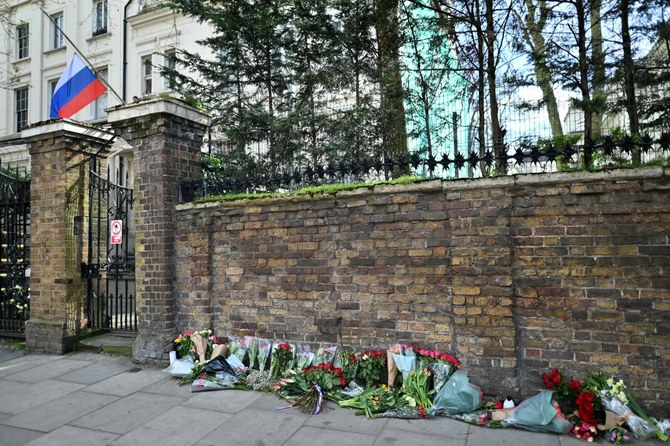
- Interior minister James Cleverly told parliament the UK would also remove the diplomatic status of several Russian-owned properties
- UK is currently a staunch NATO backer of Ukraine
London: The UK government on Wednesday raised tensions with the Kremlin by announcing it would expel a Russian defense attache for being “an undeclared military intelligence officer.”
Interior minister James Cleverly told parliament the UK would also remove the diplomatic status of several Russian-owned properties, including one in Sussex, southern England, and another in London “which we believe have been used for intelligence purposes.”
There would also be new restrictions on Russian diplomatic visas such as a cap on the length of time Russian diplomats can spend in the UK, he added.
The move comes with the UK concerned at an apparent increase in “malign” Russian activity on UK soil, including an arson attack on a Ukrainian-linked business allegedly orchestrated by the Kremlin.
A British man who it is claimed has links to the Wagner Group was charged in connection with that case last month.
London has previously accused Moscow of being behind the poisoning of two Russian former agents on UK soil, and of a spate of cyberattacks and disinformation campaigns.
The UK is currently a staunch NATO backer of Ukraine, providing training for troops and military equipment in the fightback against Russia.
Cleverly said the new package of measures was intended “to make clear to Russia that we will not tolerate such apparent escalations.”
He warned that Moscow would make accusations of Russophobia and spread conspiracy theories in response to his announcement.
“This is not new and the British people and the British Government will not fall for it, and will not be taken for fools by (President Vladimir) Putin’s bots, trolls and lackeys.
“Russia’s explanation was totally inadequate. Our response will be resolute and firm.
“Our message to Russia is clear: stop this illegal war, withdraw your troops from Ukraine, cease this malign activity.”



